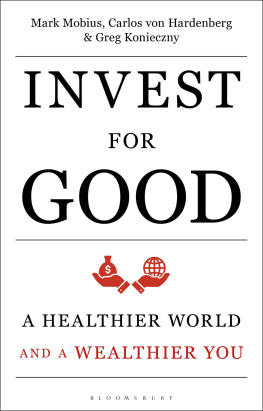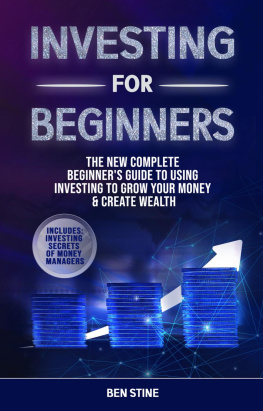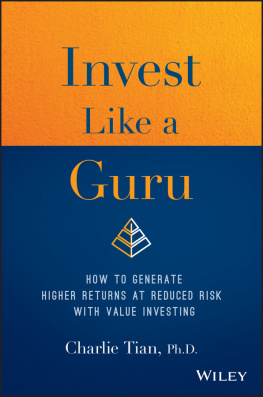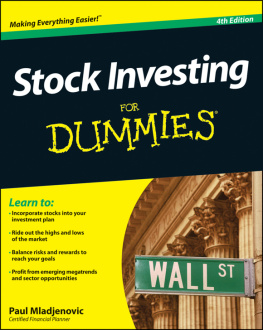
INVEST FOR GOOD

CONTENTS
The idea of this book began germinating in the autumn of 2017, when the authors snatched a few hours from their globetrotting lives as investors in emerging markets, to step back from their jobs and discuss wider issues.
They agreed that two changes, in particular, were destabilising the status quo and generating both risks and opportunities for the professional investor. The first was the rapid growth in recent years of passive funds, so called because they substitute low-cost index-tracking investment for active investor engagement with portfolio companies. The second profound change, which is, in some ways, a mirror image of the first, is the equally rapid growth in recent years of so-called ESG (environment, social, governance) investing. While the growth of passive investing is tantamount to a wholesale withdrawal of investors from engagement with portfolio companies, the growth of ESG investing is tantamount to demands by investors that portfolio companies should act in environmentally and socially responsible ways, while adhering to high standards of corporate governance.
Having identified the growth of passive and ESG investment as leitmotifs of the development of fund management in the early twenty-first century, the authors turned their attention to the implications for investment in emerging markets. They knew that the encroachment of ever larger passive funds was less pronounced in emerging markets for two reasons: because active investing in emerging markets was still producing very strong returns, and because passive investing was fundamentally unsuited to these less liquid and less efficient markets. They knew, too, that ESG investing faced more challenges in the emerging than in the mature markets, because of the relative lack of information and regulation and, consequently, a relative lack of companies in emerging markets that could pass or could be seen to pass the ESG tests.
In the light of these sea changes in investing, in general, and investing in emerging markets, in particular, the authors decided on two courses of action: set up a new company dedicated to active investing in emerging and frontier markets, with the aim to improve companies by focussing particularly on the G component, i.e. the way companies deal with corporate governance; and to write a book, this book, explaining why their approach is likely to succeed in emerging and frontier markets and how they plan to implement their strategy.
The authors believe they are well qualified for both endeavours. Dr Mark Mobius, co-founder of Mobius Capital Partners (MCP), has spent over 40 years seeking out and actively managing investments in emerging and frontier markets. Before launching MCP in March 2018, Mark worked for the Franklin Templeton Investments fund management company, latterly as executive chairman of Templeton Emerging Markets Group. During his tenure, the group expanded assets under management from US$100 million to over US$40 billion, and launched a number of emerging market and frontier funds, including private equity funds as well as open- and closed-end mutual funds.
Mark has played an important role in the development of international policy on emerging markets. In 1999, he was asked to serve on the World Banks Global Corporate Governance Forum as a member of the Private Sector Advisory Group and was co-chairman of its Investor Responsibility Task Force. He is also a member of the Economic Advisory Board of the International Finance Corporation. He has also been on the supervisory board of OMV Petrom in Romania since 2010, and is a former non-executive director of Lukoil, the Russian oil company.
As undisputed doyen of emerging markets investment, Mark has been honoured with many industry awards and plaudits, including the Lifetime Achievement Award in Asset Management by Global Investor Magazine (2017); being ranked by Bloomberg Markets Magazine as one of the 50 Most Influential People (2011); an Africa Investor Index Series Award (2010); and being ranked by Asiamoney among the Top 100 Most Powerful and Influential People (2006). In 2007, he was featured in the comic book Mark Mobius: An Illustrated Biography.
Carlos von Hardenberg, one of Mobius Capital Partners three founding partners, has 19 years of experience in financial markets, of which 17 were spent with Franklin Templeton Investments, where he started as a research analyst based in Singapore and focused on South East Asia. He lived and worked in Poland before settling in Istanbul, Turkey, for 10 years. Carlos has spent a great deal of his time travelling in Asia, Latin America, Africa and Eastern Europe, visiting companies and identifying investment targets.
He managed country, regional and global emerging and frontier market portfolios. Carlos was appointed lead manager of London Stock Exchange-listed Templeton Emerging Market Trust in 2015, where he delivered significant out-performance. He established and managed one of the largest global frontier market funds of recent years. Before joining Franklin Templeton, Carlos worked as a corporate finance analyst for Bear Stearns International in London and New York.
Greg Konieczny, the other founding partner of Mobius Capital Partners, has over 25 years of experience in financial markets, of which 22 years were spent at Franklin Templeton Investments, where he was recruited by Mark to conduct research into and manage Templeton Emerging Markets Group investments in Eastern Europe.
In 2010, Greg became fund manager of Fondul Proprietatea, the largest Romanian closed-end investment fund, and one of the largest London-listed funds, with US$ 2.7 billion in net assets. The fund included large minority interests in private and state-controlled Romanian blue-chip companies. During his seven-year engagement, he and his team in Bucharest helped to transform corporate governance standards in many of the portfolio companies, which contributed to significant improvements in their financial results and to increases in market valuations.
In his role as Director of Specialty Strategies for the whole of Templeton Emerging Markets Group, Greg was responsible for specialised country and regional strategies for Emerging Markets. He and his team engaged with large portfolio companies in various sectors and regions to improve their governance. Before joining Franklin Templeton, Greg worked for three years at Bank Gdanski, one of the largest financial institutions in Poland at the time.
It goes without saying that, with eight decades of experience in emerging markets investing between them, the authors write with some authority on the issues, ideas and concepts addressed in this book. However, given that an implication of the environmental element of ESG investing is that most books would be better left as trees, why is this book and, for that matter, a brand new fund management company, Mobius Capital Partners necessary, and why now?
There are two answers to these questions.
The first is that the authors are worried about the seemingly unstoppable advance of passive investing. They acknowledge that its low management fees are attractive to investors, but they regard it as a threat to economic development. When investors take no interest in the companies they invest in and blindly track some share index instead, they can exert no influence on the allocation of capital between companies, sectors or countries. And it is the allocations of capital we make today that determines the kind of world we will live in tomorrow.
Next page









